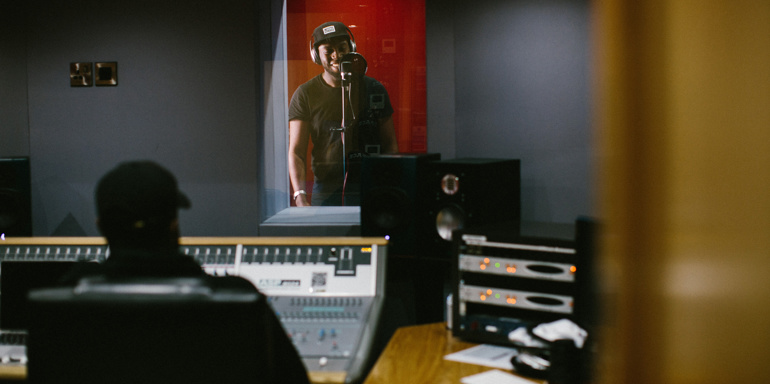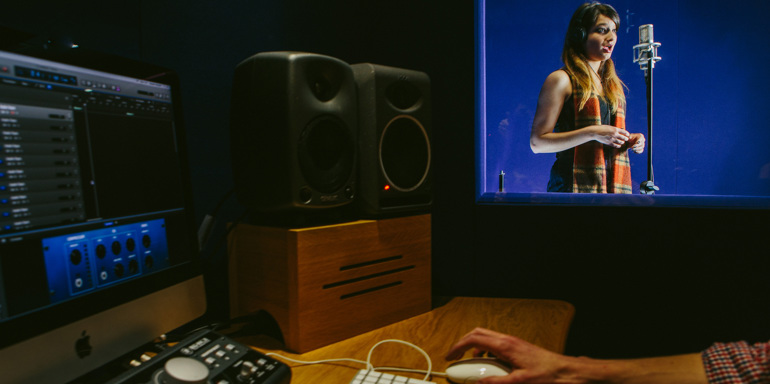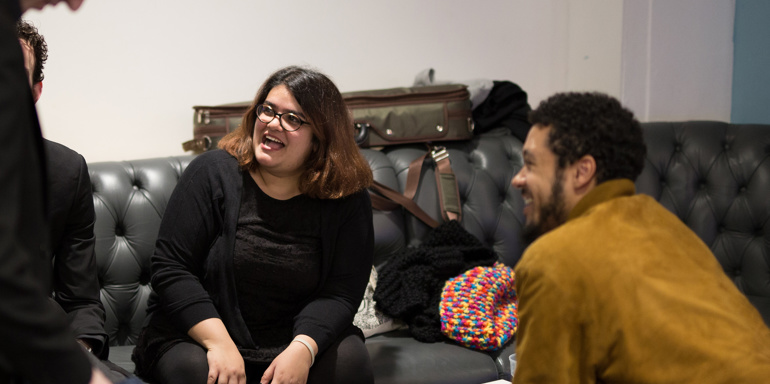Briefly explain the areas of music you work in.
I’m a songwriter, producer and session musician so I guess I spend a considerable amount of my time working where there’s no vitamin D!

What steps would you recommend students take to try and become a paid musician/songwriter?
This is the toughest and most commonly asked question of them all and one that I still ask myself every now and then. That question doesn’t really ever go away when you are self-employed. The unfortunate circumstance that comes with studying music is that qualifications don’t amount to anything more than the paper they are printed on. However, the skills that you learn, and the surrounding opportunities that come with studying music, is the absolute gold dust!
I found that saying yes to everything until you have to say no was the way to do it. The power of saying no is invaluable, but you have to build to that point somehow. I guess networking is the word that people use. It’s a horrible word and one which no one quite knows how to take on. However, meeting people via working with others opens up all kinds of new doors which you may not have been expecting. Just be open to anything, if you have the time.

What five tips would you give to someone for working successfully in a professional environment?
I’m going to have to answer this from the areas I work in. I’m not an artist so I’m always working with the artist – but really these can apply to most scenarios:
- Be on time. Self-explanatory. There’s nothing worse than someone turning up late and not apologising for it. Reputation is everything and if you start off by showing you don’t care, you’ll be shoved aside pretty quickly.
- Be humble. There seems to be a reputation that people in the music industry are scary or unapproachable. 90% of the people in every session I’ve been involved with, be it songwriting, production or recording, are really nice; that’s how they got there. Nice people get used again. Of course there’s the 10% of people who aren’t, but you tackle that as it comes. People skills are essential.
- Be great. Be good at what you do. Whatever skill you have, just be bloody good at it.
- Be malleable. Sometimes you’ll have something thrown your way which might not be your cup of tea. You might hate the genre it’s in, or it’s out of your comfort zone. Rather than dismiss and say you can’t do it figure out your own way of approaching it. Countless times I’ve had these situations thrown at me and a unique approach can amount to something original, which is what most people are looking for anyway.
- Be resilient. Easily the most important thing of all is take it on the chin if something doesn’t work out. Personally as a songwriter, I’ve written maybe 350 songs in the last five years. Around 20 have been used. Rejection is part of the game and to be able to shrug that off and start again without being emotionally effected is the greatest learning curve of all. It happens daily. It’s just part of it.

How proficient/flexible do you need to be in composition?
I feel like the most successful songwriter/producers are the ones who can adapt to whichever scenarios they are in. Take a look at the discographies of people like Greg Kurstin, Paul Epworth, Fraser T. Smith and Greg Wells. They are so varied in genre. They move with the times, and that is how a long term career unfolds.
Is this something you can make a living from?
If I was only a songwriter, I wouldn’t be making a living what so ever. It’s such a long winded process and takes years to get going. The fact that I earn money from production and session work allows me to make enough money to keep the songwriting up/pay my studio rent. Without those up front paid jobs, I wouldn’t survive. Having more than one skill is only going to help. Making a living from music tends to require you to be able to juggle all the eggs in all the baskets.

If you could look back and give yourself one piece of advice when you started out, what would it be?
I would tell myself not to get so down about someone rejecting something I’d done. I found it so disheartening when I thought I’d written something really great and it had it dismissed so easily. The industry isn’t out to get you, they’re not willing you to not succeed, they’re just being incredibly honest and wanting the best out of you. If it’s not good enough, it’s just not good enough. It has to be spectacular because the competition is so fierce.
What have been the highlights so far?
I’ve recently been spending some time in LA, which is great place to work, most recently with Jason Mraz. I’ve been working with Liam Gallagher on his solo record as a ‘one man band’. I’m hired in to play everything on the record, which is great fun but absolutely knackering… no breaks, no mercy. Oh, and guess what, he’s really nice!
Musicians' Survival Guide: Registering Works with PRS for Music
Musicians' Survival Guide: How to Use Social Media as a Marketing Tool in the Music Industry
Read the Musicians' Survival Guide: Edition 1 and Edition 2 in full here.






